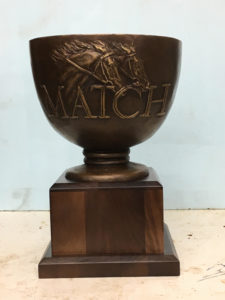By Tom LaMarra
It has been 16 years since the last edition of the MATCH Series, so why bring it back?

The 2018 MATCH trophies are a flashback to the early years of the series/THA photo
The objectives now are similar to those that led to its launch in 1997 and its run through 2001: Create a structured series of stakes for owners and trainers in the Mid-Atlantic region; schedule series races to maximize field size, and in turn pari-mutuel handle; offer divisional and overall bonuses to entice owners and trainers to participate; and build cooperative efforts among the region’s racetracks, which often compete for horses.
A meeting of racing directors on Dec. 14, 2017, at Delaware Park far exceeded expectations of the Thoroughbred Horsemen’s Association, which created the MATCH Series and has pushed, albeit in start-stop fashion, for its return.
“There has been reluctance by racetracks, which need to see meat on the bone,” THA Chairman Alan Foreman said at the beginning of the meeting. “There’s no pressure on any track or horsemen’s group to commit right now, but we know there is core support.”
Mid-Atlantic racing stakeholders, when organized, have been amenable to working together, as evidenced by their role in fostering the National Uniform Medication Program. So perhaps it wasn’t a surprise that, in less than 2 1/2 hours at the Delaware meeting, the participants had not only committed to the series but had most of the 2018 MATCH schedule in place. The series was constructed old-school style with help from a large blackboard in the Delaware Thoroughbred Horsemen’s Association office.
Scheduling required give and take. Some tracks adjusted their stakes calendars to accommodate a one-race-a-month-per-division format, while others added a few stakes to plug holes in the proposed calendar. The result is a series that is not only workable but lays the foundation for growth in the future.
The first MATCH Series in 1997 featured five divisions, each with seven stakes, at nine racetracks in five states. This year there will five races in each of five divisions at seven tracks in four states.
The landscape has changed since the first five years of MATCH. In New Jersey, Meadowlands no longer has a four-month Thoroughbred meet or a stakes schedule, and Garden State Park is now a retail and residential development. In Virginia, Colonial Downs hasn’t raced in several years–that could change in 2019. Hollywood Casino at Charles Town Races in West Virginia offered MATCH stakes in two of the series’ first five years but won’t be part of the 2018 schedule.
Unlike previous editions, divisions restricted to 3-year-olds are gone, as are divisions for males and females going long on the grass. There was consensus that other divisions in the region lend themselves to a targeted series of stakes that won’t overlap, and the result was the addition of turf sprint stakes divisions for males and females.
It’s actually a good fit given the fact Mid-Atlantic tracks decades ago were trendsetters when it came to turf sprints, and they continue to be popular in the region today.
A few other things remain constant. Even though MATCH is a THA-created product, there was participation in each of the first five years by racetracks in Pennsylvania, Virginia and West Virginia whose horsemen were affiliated with the National Horsemen’s Benevolent and Protective Association. That’s the case once again, as the Pennsylvania HBPA expressed strong interest in the series and worked with Hollywood Casino at Penn National Race Course and Presque Isle Downs & Casino to each schedule two MATCH events.
Also, the financial contributions are about the same as they were 16 years ago. Participating horsemen’s groups will provide the total bonus package of $450,000, while racetracks have anted up to pay for marketing, promotion, and other amenities such as specialized saddle cloths for MATCH events.
Historically, graded stakes have been mixed in with non-graded events in the series, and that will continue this year with six grade III stakes. It was a challenge for the racing directors to fashion divisions with purses that would be similar in value to encourage regular participation; most are in the $75,000-$100,000 range.
The hope is that the incentive of lucrative bonuses based on participation will help boost the six grade III stakes as much as the non-graded events that award the same number of points based on finish position.
An earlier meeting in October 2017 included representatives of regional breed development organizations to gauge their interest in being a part of the MATCH Series. Restrictions on how breeders’ awards can be paid by state was an impediment, but a few states are working around that.
In late March the Thoroughbred Breeders Association of New Jersey announced that, pending regulatory approval in May, it will offer $5,000 bonuses to the breeders of the top New Jersey-bred male and New Jersey-bred female by accumulated points in the MATCH Series. This is encouraging given the financial constraints in New Jersey racing and breeding over the past five years or so.
Pennsylvania, Maryland and Delaware followed suit, so there will be $40,000 in breeder and certifier bonuses tied to the final MATCH Series standings.
From 1997-2001, the final race of each division was held on the same weekend but at different tracks, on three occasions on the same day. This year, the final races of four divisions will be held on a Saturday and the last one on a Sunday (Sept. 15-16).
There was talk at the October and December meetings about having one track host all five final races in each division and, though it was too tall an order for 2018, the response was beyond encouraging. Monmouth Park in New Jersey, Laurel Park in Maryland, Parx Racing in Pennsylvania and Delaware Park all expressed interest in hosting such a “big-event day” in the future as the MATCH Series evolves.